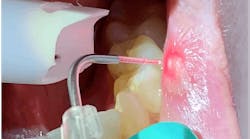Prescribed drugs for osteoporosis could pose danger
HARRISBURG, Pennsylvania--Bisphosphonates, a class of drugs commonly used for osteoporosis, have recently included a new addition to their list of side effects, osteonecrosis of the jaw--or jawbone death.
The Pennsylvania Dental Association wished to inform the public about this rare but very serious side effect of bisphosphonates. Some drugs within this class include Fosamax(R), Actonel(R) and Boniva(R), taken orally.
Other drugs include Aredia(R), Bonefos(R), Didronel(R) or Zometa(R), administered intravenously. More than 1,000 cases of ONJ have been reported in patients undergoing bisphosphonate treatments.
One of the largest reports of bisphosphonate-associated ONJ was detailed in an article by Dr. Salvatore Ruggiero, chief of the Division of Oral and Maxillofacial Surgery at the Long Island Jewish Medical Center. The patients represented in this series of case reports were preponderantly female and typically presented with bone pain, nonhealing extraction sockets or exposed bone.
"The prospective mechanism by which bisphosphonates may be associated with the development of ONJ has not been completely identified at this time," said Dr. Sean Boynes, a PDA member who is an assistant professor at the University of Pittsburgh School of Dental Medicine.
"It is clear that several issues need further clarification regarding ONJ in cancer patients treated with bisphosphonates."
Bisphosphonates work by affecting the two main cell groups in the bone, the osteoblasts (cells that make bone) and osteoclasts (cells that break down bone). Some researchers suggest that bisphosphonates shorten the life span of osteoclasts, thereby tilting the balance in favor of the bone-making osteoblasts.
This action provides a mechanism to strengthen the bones of patients diagnosed with osteoporosis or bone-related complications of cancer that destroy bone structure.
Unfortunately, this action by bisphosphonates may disrupt the delicate balance of osteoclasts and osteoblasts in the jaws of some patients, inhibiting new vessel formation and thereby impairing healing after oral surgery. This can lead to the death of bone tissues and result in osteonecrosis.
Most cases of osteonecrosis of the jaw associated with bisphosphonates have been diagnosed after dental procedures such as tooth extraction, however, the condition also can occur spontaneously.
Symptoms of ONJ include, but are not limited to, pain, swelling, or infection of the gums or jaw; gums that are not healing; loose teeth; numbness or a feeling of heaviness in the jaw, drainage and exposed bone.
Because invasive dental procedures, such as gum surgery, extractions, or other surgery that affects the bone, can worsen bisphosphonate-associated oral conditions, anyone that has taken bisphosphonates should advise his or her dentist.
"It is especially vital that patients report any symptoms or oral changes to their physician or dentist," said Dr. Boynes. "In addition, patients who have begun bisphosphonate therapy should have consistently scheduled dental hygiene appointments. The regularity of these evaluations is usually at the judgment of the treating physician or dentist, but could occur as often as every 3 months."
For more information on other oral health topics, visit PDA's website at www.padental.org.





